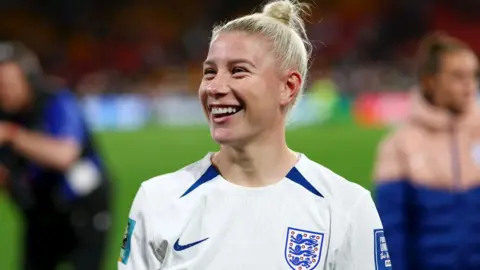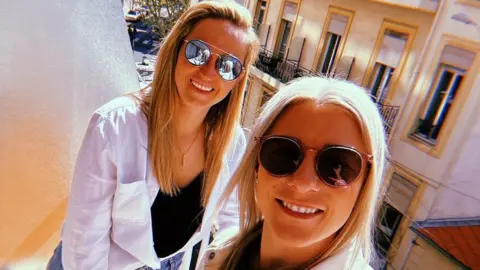Bethany England: I'm not ashamed of who I am any more
 Getty Images
Getty ImagesNext year, Lioness Bethany England is looking forward to walking down the aisle with her fiancée, Steph Williams.
It's not too long ago that a wedding between two women in the UK would have been impossible, but it all changed 10 years ago when same-sex marriage was legalised.
Bethany says 2014, when the new law came in, was about the time she realised she was gay.
Since then women's football has seen an explosive rise in popularity, and the Tottenham striker is one of many gay female players.
The 29-year-old features in a BBC iPlayer documentary - Gay Marriage and Me - looking at how many more role models have spoken up since the law came in, and where marriage equality is at in 2024.
Bethany, who grew up in Barnsley, says she "always wanted this big, fancy wedding".
But for couples like her and Steph, it's still not possible to get married in most churches.
When the law was introduced, religious organisations were automatically left out - and had to "opt in" to marry same-sex couples if they wanted to.
It also protects them from legal challenges if they don't.
The Church of England, along with many others, still defines marriage as between one man and one woman so its officials aren't allowed to legally marry gay couples unless that definition changes.
Those institutions could decide to "opt in" to same-sex weddings under the law. The Church of England would also need that decision to go through parliament.
"As much as I'm not a religious person, I know there's plenty of people out there that are in the LGBTQ+ community," says Bethany.
"So I think to deny their wishes of what they want and having to wait even longer to find someone who's willing to do it takes away from their special moment and the love they have for each other."
 Bethany England
Bethany England Even though it's not for her, Bethany says it's a "shame there's still so much work to be done" before more LGBT people can get married in ceremonies that reflect their faith.
Research by BBC Newsbeat found fewer than 3% of all religious buildings registered to marry people in England and Wales will officiate ceremonies for same-sex couples.
Some priests within the Church of England, like Reverend Jide Macaulay, an openly gay priest from Manchester, would like things to change.
"I would love to be able to celebrate and offer same-sex marriages," he says.
"The Church has evolved from issues around slavery, racism, the subjugation of women.
"I am hoping that in five years to 10 years we will see a rollover in the Church of England where we can have those marriages in our church and to be able to say to people, 'God bless you'. That is all it takes."
In a statement, the Bishop of Leicester, Martyn Snow, who leads on these issues for the Church of England, said "LGBTQ+ people are wholeheartedly welcome" in the Church and it had recently approved new prayers of blessing for same-sex couples.
"A lot of people want the Church to take the next step and introduce same-sex marriage while others - in good conscience - see this as conflicting with Christian teaching," he said.
"The Church is trying to create an inclusive space where all voices are heard and respected. We're committed to engaging in these important discussions because these are matters which profoundly affect people's lives."
In Northern Ireland it is a similar situation. Of nearly 2,800 religious officiants, 65 are registered for same-sex weddings.
The Church of Scotland and Scottish Episcopal Church and The Quakers in Britain have opted in to the legislation.
So has the Methodist Church, which voted to allow same-sex marriages in 2021.

Watch Now on BBC iPlayer: Gay Marriage and Me - 10 years on from the UK's first gay weddings, how equal is equal marriage?

Bethany's had a mixture of positive and negative experiences since realising she was gay.
"We're in a world where things are changing but there's a long way to go for people being able to be accepted," she says.
She says she "went through a period of being ashamed" but her family were "amazing" when she told them.
And despite the acceptance she feels on the pitch, Bethany says she and her partner still don't hold hands in the street.
"There's just people staring all the time," Bethany says. "I'm like, are they staring at me? Her? Us together?
"Steph doesn't want to make people uncomfortable," she says. "It's sad she has to think what others think."
And Bethany's increased profile as part of the England squad that won the 2022 Euros and made it to the 2023 Women's World Cup final has also brought more online hate.
She says it's mostly "generic" and misogynist "get in the kitchen" type comments.
But some are homophobic too, particularly when posts include her partner, and she says many can have a religious element.
"Guys saying, 'Come to my side, I'll show you a good time,' or 'You don't know what you're doing with a woman' and 'It's against God's will'," she says.
"But obviously I'm very happy in who I am and who I'm with and I've no shame in that any more."
Additional reporting by Riyah Collins


